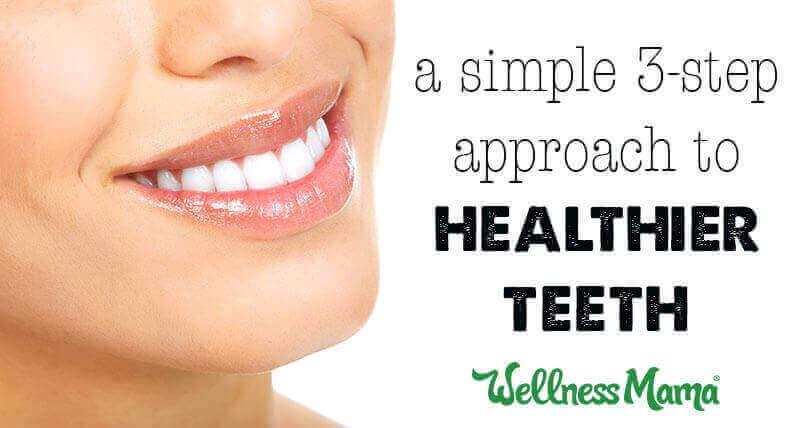I talk a lot about oral health. In fact, researching oral health is kind of a hobby of mine (I know, I know, really exciting hobby).
Ever since I read Nutrition and Physical Degeneration by Dr. Weston A. Price, I’ve been fascinated by the relationship of diet to oral health.
In recent years, continued research emerges that shows the importance of good diet for all aspects of health, including oral health.
Flossing Isn’t Important?
As common “facts” about oral health continue to be challenged, including the importance of flossing, I’m confident that we will see continued research on the link to nutrition:
Turns out, flossing isn’t all it is cracked up to be. In fact “A review of 12 randomized controlled trials published in The Cochrane Database of Systematic Reviews in 2011 found only “very unreliable” evidence that flossing might reduce plaque after one and three months. Researchers could not find any studies on the effectiveness of flossing combined with brushing for cavity prevention.”
Don’t get me wrong, I still think flossing is helpful, especially for removing food between teeth, but if it isn’t effective at actually removing the bacteria that causes tooth decay, I wanted to find something that did.
Years ago, I found a company focused on doing just that. This company creates products designed to address the bacterial balance in the mouth and gently improve this while supporting teeth and gums.
Why Oral Health Matters So Much
Many people think of the mouth as an isolated part of the body but it is anything but that!
In fact, oral health impacts the whole body in many ways. The mouth is actually a part of the immune system and affects the body in various ways.
Did you know that over 90% of adults have gum disease according to estimates?
Gum disease is an active bacterial infection in the body and affects the immune system and other parts of the body. There is even evidence that gum disease raises the risk of various types of cancer! In fact:
In fact, the plaque deposits from bad bugs in the mouth are the same types of plaque found in arterial walls in heart disease sufferers!
Crazy, right?
Beyond Flossing: Step Up Your Oral Health Routine
The new research shows that flossing isn’t the oral health panacea it has been made out to be and that it may not even help stop gum disease.
But you know what may?
1. Proper Brushing
Did you know we may have been brushing the wrong way all along?
There is a very specific way to brush that protects the gums, removes bacteria and food hiding under the gums and keeps teeth clean. It is called Bass Brushing and this is how it works:
It also depends on using a safe toothbrush with rounded bristles, like this one and a toothpaste that actually address bacteria in the mouth.
Just changing to safer toothbrushes and using this method made a big difference in my teeth and gums when I switched. In fact, I’d always had bleeding gums whenever I flossed. Using this method helped stop this and also greatly reduced by tooth sensitivity.
2. Oil Pulling and Natural Oils
Oil pulling is an ancient method of cleansing the teeth and gums by swishing oil in the mouth. There is some disagreement about the effectiveness of oil pulling, but all sources seem to agree that it is generally considered safe.
I asked my dentist before doing oil pulling to make sure it was safe and have seen whiter, smoother teeth as a result. In fact, since starting oil pulling, I’ve found that I have no plaque at all at dental appointments and that my teeth are much less sensitive.
I use coconut oil as the oil for oil pulling since it has been studied and is effective against the bacteria found to cause cavities and gum disease.
What I do:
I swish with a spoonful of coconut oil daily while I’m showering each morning. I also add a few drops of OraWellness brushing blend, as it contains essential oils that are also good for reducing gum disease.
Nutrition and Oral Health
Nutrition is also vital for all aspects of health including oral health. There are some specific nutrients that are especially helpful for tooth and gum health. Dr. Weston A. Price and the Drs. Mellanby (a husband and wife team) researched the role of Vitamin D, Vitamin K (which they called Activator X) calcium, magnesium and phosphorus in creating strong teeth.
They found that those who consumed high amounts of fat soluble vitamins and minerals had lower rates of tooth decay than those who didn’t. Their research also showed that it was important to avoid phytic acid (found in highest amounts in grains and beans).
What I Do:
Focus on eating whole foods in their natural form. I’m especially careful to make sure my family is getting enough:
- Protein from whole food sources like pastured meats
- Fat soluble vitamins and beneficial fats from food sources like fatty fish, liver and coconuts
- Other nutrients from plenty of vegetables and fruits
We also avoid processed foods that contain sugar or refined flours, which can be harmful for teeth (and other parts of the body).
My 3 Step Plan for Great Oral Health
Prefer a short to-do list instead of a recommended reading list?
These are the simple steps I do daily to improve oral health.
1. Bass Brushing
Use this rounded tip Bass Brush to brush daily with OraWellness HealThy Mouth blend and follow the instructions in the video above.
2. Oil Pulling
I also swish daily with coconut oil with a few drops of Brushing Blend. This has made a huge difference in my oral health.
3. Good Diet
Focus on eating unprocessed real food and avoid refined flours, sweeteners and vegetable oils.
How do you take care of your mouth?


Leave a Reply